MercoPress. South Atlantic News Agency
Tag: International Criminal Court (ICC)
-
Friday, October 29th 2021 - 10:56 UTC
ICC praises Colombia´s determination for justice, accountability and peace
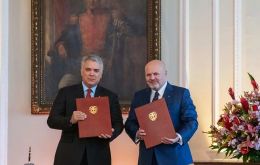
The Prosecutor of the International Criminal Court Karim Khan on a visit to Colombia and Venezuela, on Thursday in Bogotá concluded a Cooperation Agreement with the Government of Colombia, which renews the commitment of the Office to Colombia's national accountability processes.
-
Thursday, October 21st 2021 - 09:44 UTC
Brazil's CPI finds Bolsonaro should face 10 criminal charges for his handling of the COVID-19 crisis
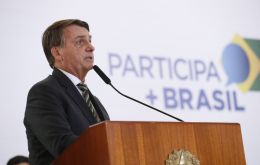
Brazilian Senator Renan Calheiros, rapporteur of the Upper House's Parliamentarian Commission (CPI) investigating President Jair Bolsonaro for his handling of the COVID-19 pandemic, Wednesday announced 10 criminal charges were to be filed against the head of state.
-
Wednesday, October 13th 2021 - 09:40 UTC
Charges filed against Brazil's President before ICC: “The Planet vs. Bolsonaro”

Charges against Brazil's President Jair Bolsonaro have been filed before the Hague-based International Criminal Court (ICC) for deforestation of the Amazon, it was announced Tuesday.
-
Saturday, August 14th 2021 - 08:56 UTC
Maduro regime rejects ICC Prosecution condemnatory report; warms up to new prosecutor, UK's Karim Khan
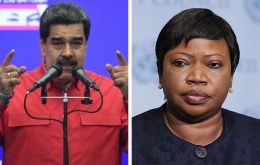
The regime of Nicolas Maduro in Venezuela rejected point blank the condemnatory report from the International Criminal Court, ICC, Prosecution which confirmed that Chavista forces repeatedly committed crimes against humanity in the country.
-
Tuesday, August 10th 2021 - 07:49 UTC
Brazilian indigenous group APIB files criminal charges against President Bolsonaro before ICC
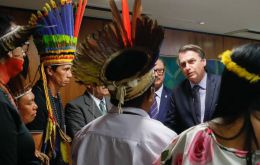
Indigenous lawyers have filed genocide charges against Brazil's President Jair Bolsonaro before the International Criminal Court (ICC) based in The Hague, it was announced Monday.
-
Wednesday, December 11th 2019 - 11:32 UTC
Charges against Evo Morales filed before ICC, law firm announces
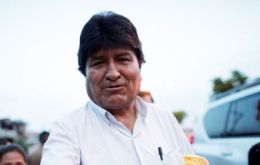
Charges for crimes against humanity against former Bolivian President Evo Morales have been filed by November 30 last before The International Criminal Court (ICC) at The Hague, a Paris-based law firm confirmed on Tuesday.
-
Tuesday, November 20th 2018 - 12:55 UTC
Colombia to cut all diplomatic ties with Venezuela starting in January
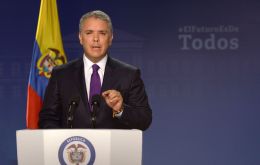
Colombian President Iván Duque announced that his country will sever all diplomatic relations with Venezuela as of January next year when Nicolás Maduro, whom he considers to be a “dictator,” starts a new consecutive term as head of state.
-
Sunday, October 28th 2018 - 16:50 UTC
Venezuela angered by Germany's joining list of countries that want Maduro before ICC
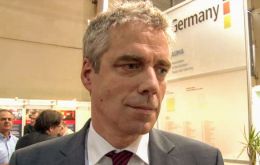
The Venezuelan Foreign Minister Friday summoned Germany's ambassador in Caracas, Daniel Kriener, to deliver a note of protest for Berlin's express support to an International Criminal Court (ICC) enquiry into alleged human rights violations by the Nicolás Maduro regime.
-
Friday, September 28th 2018 - 08:34 UTC
Controversial Almagro’s “complete support” for the Referral to ICC of Venezuela Investigation
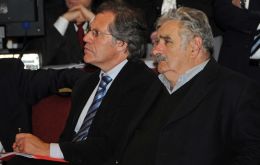
The controversial Secretary General of the Organization of American States (OAS), Luis Almagro, expressed his complete support for the decision of the presidents of Argentina, Mauricio Macri; of Chile, Sebastián Piñera; of Colombia, Iván Duque; of Paraguay, Mario Abdo Benítez; of Peru, Martín Vizcarra; and of the Prime Minister of Canada, Justin Trudeau, to refer to the International Criminal Court (ICC) the investigation into the existence of crimes against humanity in Venezuela.
-
Thursday, August 23rd 2018 - 09:12 UTC
The democratic challenge to dictatorships and xenophobia in Latin America
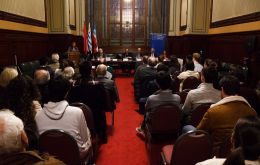
During the conference entitled “The democratic challenge to the autocracies of the 21st century in Latin America,” organized by the Center for the Opening and Development of Latin America (CADAL) on Tuesday at the Senate of Uruguay, the Government of Venezuela was described as a “dictatorship” and it was exhorted that the democratic governments of the region, especially the Uruguayan government, not be indifferent or “accomplices” against today’s Latin America’s autocratic governments.
